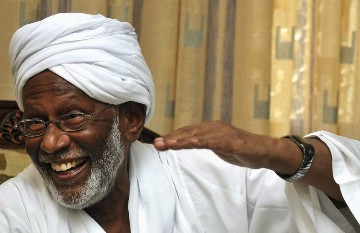Islamist opposition leader says Sudanese people have become “indifferent”
June 11, 2013 (KHARTOUM) – The Sudanese Islamic figure and leader of the opposition Popular Congress Party (PCP), Hassan Al-Turabi repeated his harsh criticism of the government but also blamed the ordinary citizens for their “indifference”.

The PCP top figure further said that Khartoum abuses power through tyranny pointing out that it divides regions and states and appoints and dismisses state governors however and whenever it wants.
He criticized the government’s handling of several major issues in Sudan including the conflict in Sudan’s western region of Darfur and asserted that regime does not care about the situation in the war ravaged region as long as it does not threaten its grip on power in Khartoum.
The Islamist scholar reiterated his denial of any connection between his party and the Darfur rebel Justice and Equality Movement (JEM) as alleged by Khartoum.
Turabi nonetheless strongly warned against a military coup in Sudan saying that its consequences would be “disastrous”.
He acknowledged that opposition is fractured and said that political parties are incapable of leading an uprising against the government mentioning that the regime knows how to defend itself.
However he emphasized that change is coming to Sudan either through peaceful means or revolutionary change similar to Sudan’s October 1964 uprising and the Arab spring revolutions in Egypt and Tunisia.
He pointed out that the opposition had drafted a transitional constitution to govern the country in the transitional period following the downfall of the regime, saying that it would lead to constitutional elections to determine the choice of the people.
The Islamic leader said that the opposition will not accept a national government within the framework of the current regime.
He went on to criticize the Sudanese people, saying that they became indifferent toward the surrounding circumstances and non-responsive to the need for political transformation and democracy.
The Islamic leader also blasted the media situation in Sudan, saying that the regime is largely using it for propaganda.
Since his ouster in 1999, Al-Turabi has been one of the government’s most vociferous critics and has been incarcerated a number of times.
Turabi was president Omer Hassan al-Bashir’s close political and religious ally since the 1989 coup that was planned by the National Islamic Front (NIF) he led at the time.
However, both men fell out together in a bitter power struggle that started in 1999. Since then Turabi has been in and out of jail but was released along with all other political prisoners after a north-south peace deal in 2005.
The Islamist leader has been an outspoken critic of Bashir and his government since then.
(ST)
